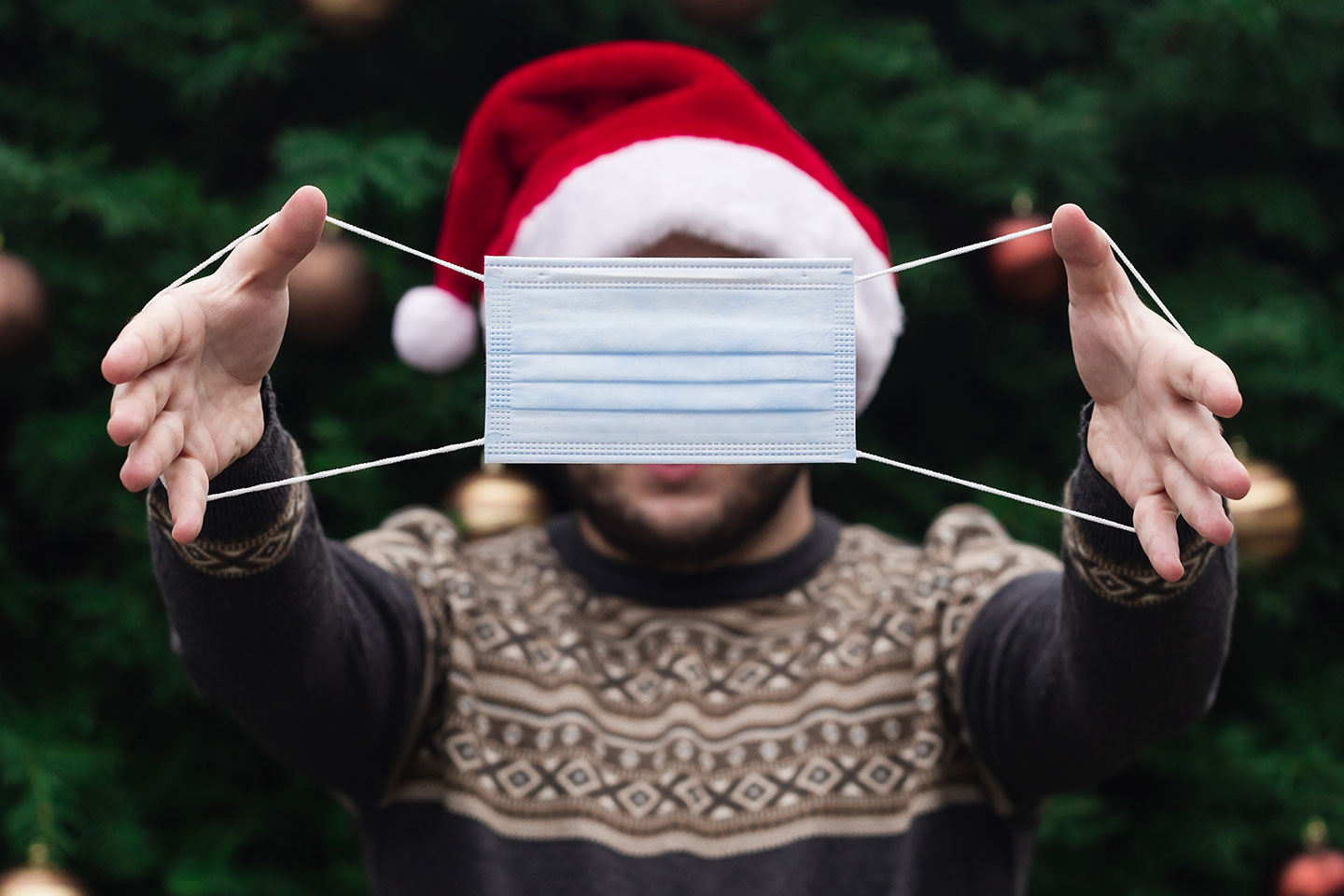How to stay safe from COVID-19 this festive period
COVID-19-related restrictions differ from country to country, but as families gather to celebrate during the festive holidays there are some important things you can do to protect yourselves and your loved ones against coronavirus.
- 14 December 2020
- 5 min read
- by Linda Geddes

We’ve learned a lot about SARS-CoV-2 since its emergence 12 months ago. We now know that it spreads predominantly via respiratory droplets, compelling us to keep our distance from other people; but that it can also linger in smaller airborne particles, which means keeping our homes and offices well-ventilated as well. And the virus can also be transmitted through contact with infected surfaces – including hands – so it is important to keep these, and frequently touched surfaces like doorknobs and handrails clean too. For these reasons, meeting people outdoors is widely considered to be the safest strategy – but even here, beware of getting too close to other people, or transmitting the virus through shared objects, such as passing a plate or glass.
Shorter visits are always better than longer visits, because the virus will have less time to accumulate indoors.
If you live in the northern hemisphere, it may feel too cold or damp to meet relatives outside. Some people may consider postponing any festivities until more people have been vaccinated against COVID-19. And most health authorities advise against meeting indoors, if this can possibly be avoided. But for those set on indoor meet-ups with friends or family, there are ways to make this a bit safer.
Silent transmission
It goes without saying that if you have any COVID-related symptoms you should avoid contact with other people, and if possible, order a COVID-19 test. However, around one in five infected people have no symptoms, which means you could be carrying the virus, and potentially transmitting it, without knowing it. This could also be the case if you have very recently been infected, and have not yet developed symptoms.
Even if you have already had COVID-19, it is possible that you may be carrying and transmitting the disease. The same may apply to people who have been vaccinated against it; we don’t yet know if COVID-vaccines will prevent the transmission of disease. So, no-one should feel safe, and it is everyone’s responsibility to keep other people safe.
One strategy, therefore, could be to self-isolate for a period of time, before visiting more vulnerable friends or family members – ideally for 14 days. Of course, this won’t be possible for people who have to go out to work, take their children to school, or attend school or college themselves. But fortunately, there are other things that they can do.
Have you read?
Timing matters
Shorter visits are always better than longer visits, because the virus will have less time to accumulate indoors. You could also consider combining indoor and outdoor activities, to reduce the amount of time you spend with friends and family in an enclosed space.
Reducing transmission risk indoors
Because coronavirus is thought to linger in the air in enclosed and poorly ventilated spaces, it is important to increase air circulation as much as possible, by opening windows and doors. This will dilute any virus which is present, reducing the risk to yourself and other people.
Good hand hygiene and disinfecting frequently-touched surfaces will reduce the risk of transmission by touch. Making alcohol gel available at the entrance to your home, on tables, and in the toilet, is one way of reminding people that they should frequently be disinfecting their hands. This also applies to bathrooms, because there is evidence that the virus can be shed in faeces. To reduce the risk of any virus becoming airborne during toilet flushing, close the lid before you flush. And remember that the rule about good ventilation also applies to bathrooms.
Also, a word about washing up: Handling plates, cups or cutlery that have been touched by other people could provide a further method of virus transmission, so ideally guests should bring their own tableware and take it home with them afterwards. If this is impractical, strict hand hygiene would help reduce, but not eliminate the risk. At the very least, avoid having the most vulnerable person in the house do the washing up or load the dishwasher, and ensure that whoever does do it washes their hands immediately afterwards.
Keep your distance
It may feel unnatural to keep your distance from loved ones, but the further apart you are, the less likely you are to come into contact with virus, or spread it. Wearing a mask should trap many of the larger respiratory droplets we emit while speaking, coughing and breathing, but it won’t completely eliminate the risk of transmission, so you still need to stay at least 1-2 metres apart.
Doing so could make communal dining challenging, so limit the number of guests to the bare minimum, and where possible, seat people from different households at separate tables – or if you have the space, you could consider a U-shaped table arrangement. The risk of transmission can be further reduced by avoiding seating people from different households immediately opposite one another. This is because speaking causes respiratory droplets, including tiny airborne particles, to be ejected into the air – and potentially into the face of your dining partner. Also, try not to get too carried away with the festive spirit by talking or singing too loudly, and keep any background music to a minimum so you don’t have to raise your voice. Because the louder people speak, the more respiratory droplets they emit. Finally, stay safe, and have an enjoyable festive holiday period.







